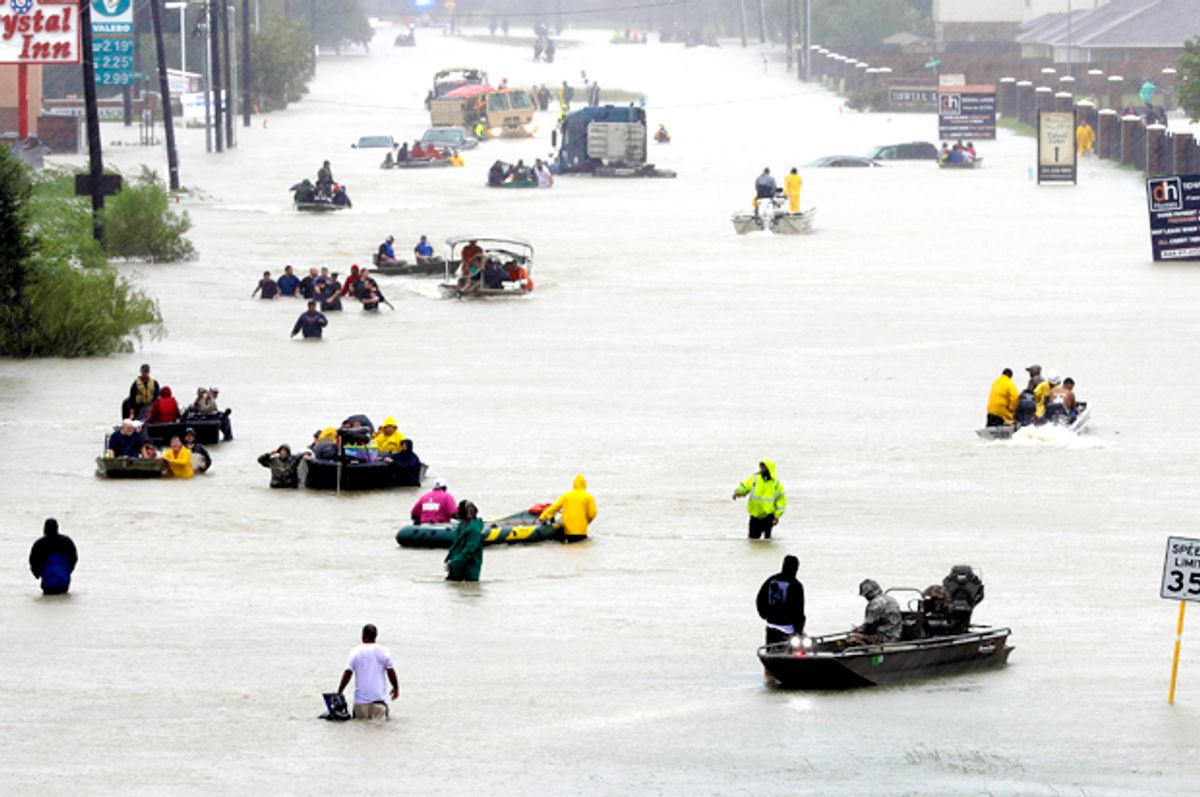The nation watched in horror as, for the second time, torrential rains drowned an American city. Since our president could do little more than marvel at the power of Hurricane Harvey from Camp David, and wish Texans a dismissive, "Good luck," it's up to everyday Americans to pick up the slack. Read on for how you can help hurricane victims, protect DACA recipients and march against white supremacy.
Protect DACA (Again)
Donald Trump has wavered on whether to abolish the Deferred Action for Childhood Arrivals (DACA) program, almost since he announced his candidacy. While blunt about his disdain for immigrants in general, and Mexican immigrants in particular, he was less consistent regarding children born in America to undocumented parents. In April he told the Associated Press that DACA recipients should “rest easy,” and that he is “not after the Dreamers [recipients of DACA],” but “after the criminals.”
Then, 10 attorneys general, led by Ken Paxton of Texas, wrote to Attorney General Jeff Sessions demanding that the Trump administration dismantle DACA by September 5, or they’ll sue. Jeff Sessions is no fan of the program, and with the deadline looming, many advocates are afraid Trump will abandon his “rest easy” rhetoric, and eliminate the program in order to score points with his base.
This means a renewed push to call your senators and ask them to co-sponsor the bipartisan Durbin-Graham DREAM Act (S. 1615). You should also call your House reps and ask them to co-sponsor Rep. Luis Gutierrez’s American Hope Act (H.R. 3591), which would also provide a path to citizenship.
Hurricane Harvey help
Texas governor Greg Abbott called Hurricane Harvey “one of the largest disasters America has ever faced.” It’s already left the Houston area deluged with 40 inches of rain, and forecasters are predicting at least 10 more inches of rain by week's end. At least 10 people are dead, with many more missing, and thousands displaced from their homes.
As the hurricane continues to batter Texas, organizations on the ground are focusing on basic needs and immediate recovery. Unless you have a boat and can get to people in need of rescue, the best action you can take is donating cash to organizations, especially local organizations, engaged in the rescue and recovery efforts.
New Yorker writer Jia Tolentino, a Houston native, has compiled a guide to local organizations on her Twitter feed. So has Texas Monthly, NPR and the New York Times (which also includes advice on how to avoid scams). The Red Cross may have the easiest and most recognizable text-to-donate system, but we’d recommend you read ProPublica’s series on how the Red Cross mismanaged its donations following Hurricane Katrina, the 2010 earthquake in Haiti and Hurricane Sandy, before making a donation.
The recovery effort, Gov. Abbott admitted, will be a long one. Compounding the problem is the Trump administration’s rollback of the 2015 executive order establishing federal flood regulations. That order established a federal flood risk management standard, which developers seeking federal funds for their construction projects were required to meet. Repealing the order was an opportunity to do what Trump loves best: eliminate regulations for big businesses and undo President Obama’s legacy. Then there’s the National Flood Insurance Program, which with 5 million policyholders and $24.6 billion in debt, is set to expire September 30. Several proposals from both sides of the aisle were floated around the Senate Banking Committee, but as Paul McCleod and Zahra Hirji report in Buzzfeed, “dealing with the fallout from Harvey is pushing back those discussions.” It’s “been put on the backburner,” a Senate staffer told them.
Even without a clear bill to push, you can still call your reps and demand that they send aid to Texas, and that some of that funding goes toward preventing future disasters. You can also support organizations dedicated to disaster prevention and rebuilding, like BakerRipley.
Charlottesville to Washington, D.C., March Against White Supremacy
The Women’s March organizers, along with Color of Change, Indivisible, Repairers of the Breach and the Movement for Black Lives, Working Families Party, and others, kicked off a 10-day March against White Supremacy on Monday, August 28.
They’re doing so to protest Donald Trump’s weak response to Charlottesville, and a rise in hate crimes and emboldened white supremacists. Marchers will cover anywhere from 3 to 18 miles a day, stopping at Confederate monuments and picking up new marchers along the way. If you want to participate, but your legs and lungs aren’t up to it, you can choose the section that works best for you. The website has all of the logistical details.
The march ends in Washington, D.C., with a series of actions on September 6. Organizers are keeping the specifics of that action underwraps as of this writing, but those interested should keep an eye on the website.




Shares